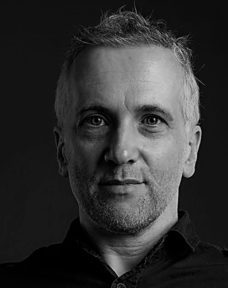
Image credit © Jojo Moreschi, 2018.
I’m welcoming Tom Vowler to the blog today. Tom is the author of short story collection, The Method, novels What Lies Within and That Dark Remembered Day and is here to talk about his latest story collection, Dazzling the Gods, which I reviewed for Wales Arts Review.
Tom, you travel from Ireland to Paris, the Gaza Strip, from London to Lucca in Tuscany, and around the coast, woodland and countryside nearer to home in this collection. Is place the starting point for you when writing?
Place can be a way into a story, yes, certainly the Paris fiction came after a visit to the Musée d’Orsay. I’m generally compelled to give the reader a ‘felt’ world, to ground and immerse themselves in, place often functioning more than just allegory or aesthetic, but as character itself, to take on meaning beyond its physicality. Proust spoke of landscape having four dimensions, the fourth being time, the places we inhabit having not just a present but a past and future. Characters must never be merely inhabitants of a place but products of it.
As I was reading, I noticed that lives and loves not fulfilling their potential is a recurring theme, with childlessness especially noticeable throughout the collection. Was this something that you wanted to explore in particular?
Theme, for me at least, tends to emerge unconsciously, and I’m often unaware of such patterns throughout a collection until they’re highlighted by a reader. I suppose it’s hard to ever fully escape the primordial swamp of our psyche, and the short story more than most forms concerns itself with human truths more than escapism. And people who do fulfil their potential are generally dull, I find.
I hadn’t realised the prevalence of childlessness running like a seam through the collection. Oh the delight a psychoanalyst could take in trawling an author’s oeuvre.
In Lucca: Last Days of a Marriage, an editor works on a late author’s manuscript, someone who “troubled his sentences into existence, cared for them as one might a prized possession or one’s child.” Is this how you’d describe what you do as a writer? How would you explain it?
Very meta that story, probably too much so. I was drawn to the idea of a posthumous edit, how you might finish a manuscript for an author without demeaning it. The editor in question wrestles with this almost unreasonable task, to both second guess the author’s intentions and to remain consistent to the aesthetic course charted.
I do concern myself with fiction at a sentence level, yes, regarding them as units of energy that must function at optimum efficiency, neither over- nor under-written. I loathe writing that seems to merely borrow language as a basic tool with which to build the story, as if it had no significance in its own right. The best writing is troubled into existence, functioning on myriad levels, from the pragmatic to the sublime.
Do you have different criteria for what makes a short story work for you, depending on whether you’re reading one or writing your own? What are they, and have you ever abandoned them?
What makes a story work is a complex alchemy and I’m wary of being prescriptive, elevating one formula above another. So many are abandoned, of course, and even the ones I regard at the time as effective seem deeply flawed with hindsight. Perhaps this is a useful motivator: the quest to write a very good, or even great, story. Certainly I haven’t come close to the latter.
In terms of criteria, if such things must exist: a story should shift something in the reader at an affective, primal level; it must rupture something in us so we are not quite the same person having read it. Imagine that: a precise sequence of black marks on a page changing forever who we are. Large truths delivered in tight spaces, to borrow from Barbara Kingsolver.
How do you approach reading a short story collection? Do you leave space between stories?
I’m drawn to titles usually, or just at random. I always savour a collection, rarely reading stories back to back. They take so long to put together, it always feels an insult to the author to rush through them.
And finally, can you give me an idea of how long this collection has taken to put together and the process you’ve gone through?
The collections take a lot longer than a novel, despite possessing fewer words, as if the disparity between stories amplifies the compositional process. I’m a big reviser, not necessarily great structural changes, more surgical attendings, starting with the macro, then tapering down to how the sentences sound, even how much white space there is on the page. Years to write, months to revise. Then an editor comes along and changes everything anyway.
Thanks to Tom for providing such interesting answers.
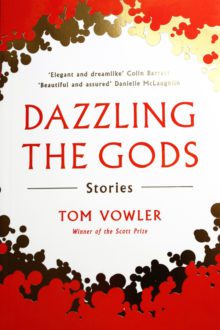 Dazzling the Gods by Tom Vowler is out now in paperback from Unbound and is available from all good book retailers.
Dazzling the Gods by Tom Vowler is out now in paperback from Unbound and is available from all good book retailers.
Unbound enables authors to write the books they want and readers to help fund the books they would like to read by pledging what they can afford for one of a series of bundled rewards.
You can find out more about Tom and his writing by visiting his Author Website or you can follow him on Twitter or via his Facebook page.
*GIVEAWAY* I have a signed copy of Dazzling the Gods to give away. All you have to do is to pop a comment below and the squirrels will pick a winner at the weekend.
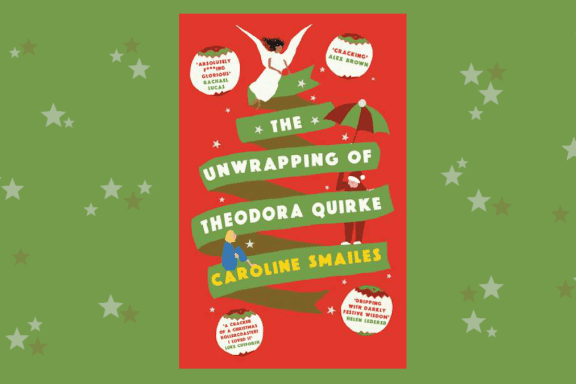
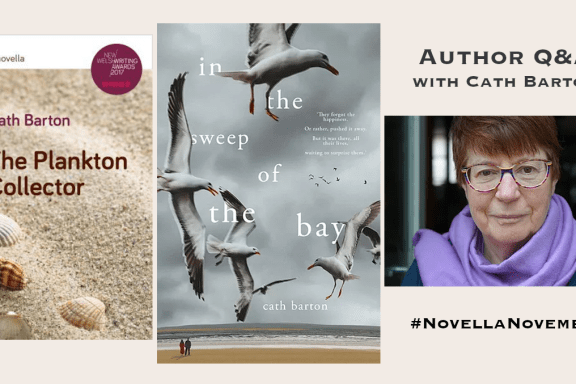
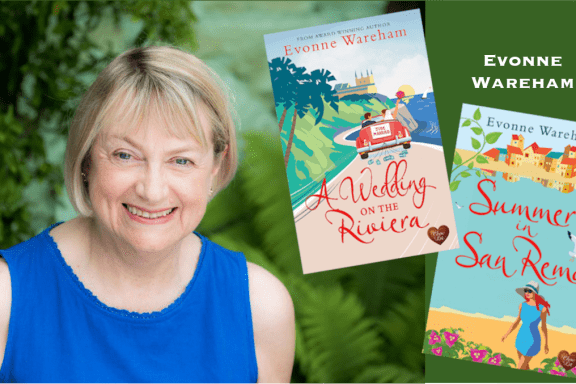
This sounds a fascinating collection. I love the idea of sentences as ‘units of energy’, and troubling writing into existence. I think there is an invisible pause built into the end of each short story, which is space for thought, and like to respect it – let the story breath awhile, and settle. Nice interview and interesting questions, good luck with the book, Tom!
Yes, I agree. Treating sentences as units of energy helps you to appreciate that they not only need to work as a whole but each need to work independently. Will pop a copy of this fascinating collection in the post to you. Thanks for stopping by and I hope you enjoy reading Dazzling the Gods!
Thanks so much for a great Q & A: lots of insight and learning. It was interesting to gain insight into the reader’s experience – how they can discover and pull out themes etc within the writing, which may not have been a part of the writer’s original intention. I was really interested to read how Tom Vowler uses place – the fourth dimension and ‘time’. I am inspired to read these stories! Always great to discover new writers!
Thanks for visiting, Kerry. I thought you might be interested in the use of place, and what’s gleaned from the story by a reader. If it’s inspired you, I have to get a copy to you as soon as possible! Hope you enjoy this collection.